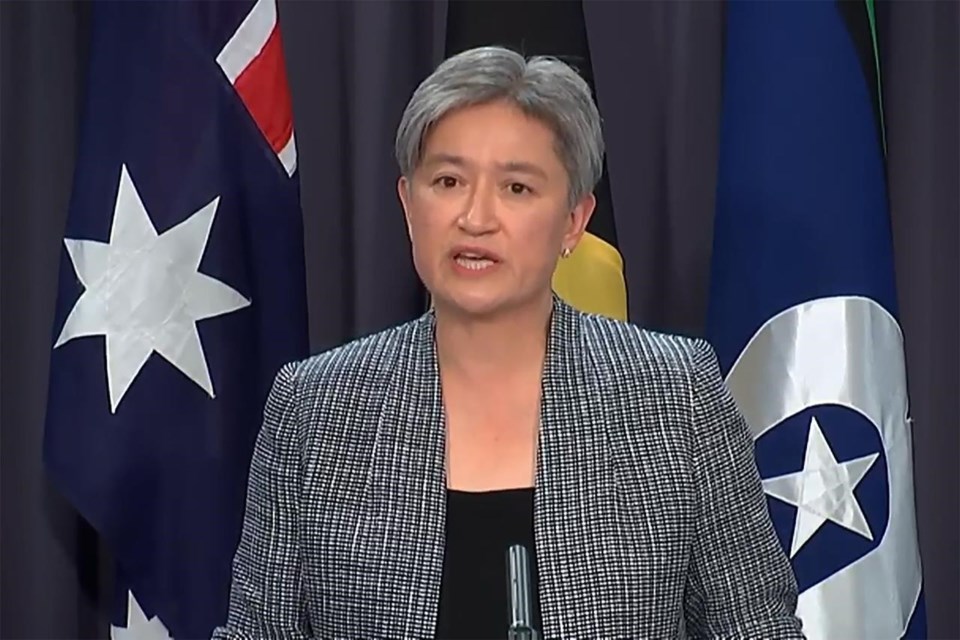CANBERRA, Australia (AP) — Australia has reversed a previous government's recognition of west Jerusalem as Israel's capital, the foreign minister said Tuesday, prompting consternation from Israel.
The center-left Labor Party government agreed that the Australian Embassy would remain in Tel Aviv, as it has been. The Cabinet also reaffirmed that Jerusalem’s status must be resolved in peace negotiations between Israel and the Palestinians, Foreign Minister Penny Wong said.
Australia remained committed to a two-party solution to the , and “we will not support an approach that undermines this prospect,” Wong said.
Israel's Prime Minister Yair Lapid expressed disappointment in Australia's changed position.
"Jerusalem is the eternal undivided capital of Israel and nothing will change that,” Lapid said in a statement.
Wong said her department made an error by updating its website on Australia’s revised policy on Israel’s capital before Cabinet had confirmed the change.
This led to conflicting media reports on Australia’s position before Wong’s announcement.
Lapid appeared to blame this media confusion for Australia changing its policy.
“In light of the way the decision was made in Australia, as a hasty response to a mistaken report in the media, one can only hope in other issues the government of Australia behaves more seriously and professionally,” Lapid said.
Israel’s Foreign Ministry said it will summon the Australian ambassador to express “deep disappointment" over a decision that was "based on short-sighted political considerations.”
Senior Palestinian official Hussein Al-Sheikh said he welcomed Australia’s decision “and its affirmation that the future of sovereignty over Jerusalem depends on the permanent solution based on international legitimacy.”
Former conservative Prime Minister Scott Morrison as Israel's capital in December 2018, although the Australian Embassy remained in Tel Aviv.
The change followed then-U.S. President Donald Trump’s decision to move the U.S. Embassy from Tel Aviv to Jerusalem. President Joe Biden has kept the embassy in Jerusalem as the U.S. steps back from its once-intense mediation between the , who have not held substantive peace talks in more than a decade.
Wong described Morrison’s move as out of step internationally and a “cynical play" to win a byelection in a Sydney locale with a large Jewish population.
Morrison’s Liberal Party ran Jewish candidate Dave Sharma who was defeated in the byelection but won the seat in the next general election.
Morrison’s government was elected out of office in May after nine years in power.
Nasser Mashni, vice president of the human rights group Australia Palestine Advocacy Network, thanked the government for “differentiating itself from the dangerous political posturing of the previous government.”
“This reversal brings Australia back into the international consensus — Australia must not pre-empt the final status of Jerusalem,” Mashni said in a statement.
“Israel asserts that the entire city is exclusively theirs, denying Palestinian connection to their ancient spiritual, cultural and economic capital,” Mashni added.
The Executive Council of Australian Jewry, which represents Australia's Jewish community, branded the reversal a “gratuitous insult to a key economic and strategic ally.”
“This decision panders to the most extreme elements of the Labor Party and will also serve as a disincentive for the Palestinians to return to negotiations,” the council said in a statement.
Morrison, who remains an opposition lawmaker, said the government's decision was disappointing.
The decision "represents a further diminution in Australia’s support for the state of Israel by the Labor government from the high water mark established by the Morrison government,” his office said in a statement.
But opposition leader Peter Dutton left the door open to the conservatives abandoning Morrison’s policy.
“We’ll make an announcement about our policy in the run-up to the next election,” Dutton told reporters. The next election is due in 2025 .
Opposition foreign affairs spokesperson Simon Birmingham described the change as a “completely unnecessary decision” that followed a “shambolic process.”
In the 1967 Mideast war, Israel captured east Jerusalem, home to holy sites of three faiths, along with the West Bank and the Gaza Strip. The Palestinians seek east Jerusalem as the capital of a future state. The status of Jerusalem remains one of the thorniest issues in the decadeslong conflict and has precipitated numerous rounds of violence.
Only a handful of countries, including Kosovo and Guatemala, have joined the U.S. in recognizing Jerusalem as Israel’s capital.
___
Associated Press writer Ilan Ben Zion in Jerusalem contributed to this report.
___
This story has been updated to remove an incorrect reference to the Australian government again recognizing Tel Aviv as the capital. Wong said the embassy would stay in Tel Aviv but did not mention recognizing the city as the capital.
Rod Mcguirk, The Associated Press




